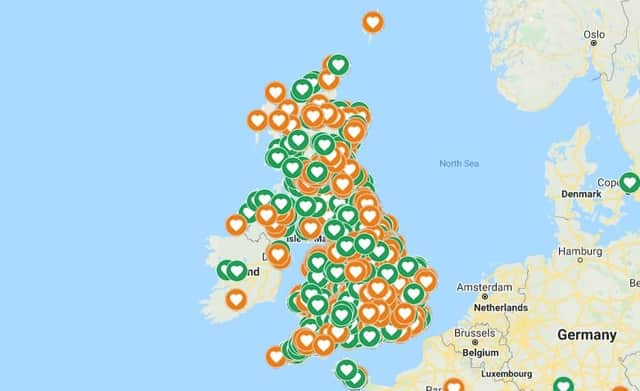This is how to find your nearest defibrillator - and how to do CPR


Football fans were left in shock on Saturday night when Danish footballer Christian Eriksen collapsed during his country’s European Championship fixture with Finland.
With his life apparently in the balance heroic emergency response team members performed CPR on the midfielder.
Advertisement
Hide AdAdvertisement
Hide AdAs of Sunday afternoon the former Tottenham player is in hospital in a “stable” condition according to the Danish FA.
The emergency incident has led to calls for more defibrillators to be placed at football grounds and other public spaces across the country.
How do I find my nearest defibrillator?
A database of publicly available defibrillators can be found at heartsafe.org.uk.
Defibrillators available 24 hours a day, seven days a week are marked as green.
Advertisement
Hide AdAdvertisement
Hide AdDefibrillators marked as amber are available during limited hours. The hours can be found by clicking on the location on the interactive map.
What should I do in the event of a cardiac arrest?
The British Heart Foundation advises taking the following steps:
- Call 999
- Start CPR
- Ask someone to bring a defibrillator if there’s one nearby
- Turn on the defibrillator and follow its instructions.
How do I perform CPR?
The NHS outlines how to perform CPR as follows:
- Place the heel of your hand on the breastbone at the centre of the person's chest. Place your other hand on top of your first hand and interlock your fingers.
- Position yourself with your shoulders above your hands.
Advertisement
Hide AdAdvertisement
Hide Ad- Using your body weight (not just your arms), press straight down by 5 to 6cm (2 to 2.5 inches) on their chest.
- Keeping your hands on their chest, release the compression and allow the chest to return to its original position.
- Repeat these compressions at a rate of 100 to 120 times a minute until an ambulance arrives or you become exhausted.
Advice adds: “If you have been trained in CPR, including rescue breaths, and feel confident using your skills, you should give chest compressions with rescue breaths.
Advertisement
Hide AdAdvertisement
Hide Ad“If you're not completely confident, attempt hands-only CPR instead.”
How to perform CPR on a child over 1 years old
NHS advice states the following:
“Open the child's airway by placing 1 hand on their forehead and gently tilting their head back and lifting the chin. Remove any visible obstructions from the mouth and nose.
“Pinch their nose. Seal your mouth over their mouth, and blow steadily and firmly into their mouth, checking that their chest rises. Give 5 initial rescue breaths.
“Place the heel of 1 hand on the centre of their chest and push down by 5cm (about 2 inches), which is approximately one-third of the chest diameter. The quality (depth) of chest compressions is very important. Use 2 hands if you can't achieve a depth of 5cm using 1 hand.
Advertisement
Hide AdAdvertisement
Hide Ad“After every 30 chest compressions at a rate of 100 to 120 a minute, give 2 breaths.
“Continue with cycles of 30 chest compressions and 2 rescue breaths until they begin to recover or emergency help arrives.
How to perform CPR on infants under 1 year old
“Open the infant's airway by placing 1 hand on their forehead and gently tilting the head back and lifting the chin. Remove any visible obstructions from the mouth and nose.
“Place your mouth over the mouth and nose of the infant and blow steadily and firmly into their mouth, checking that their chest rises. Give 5 initial rescue breaths.
Advertisement
Hide AdAdvertisement
Hide Ad“Place 2 fingers in the middle of the chest and push down by 4cm (about 1.5 inches), which is approximately one-third of the chest diameter. The quality (depth) of chest compressions is very important. Use the heel of 1 hand if you can't achieve a depth of 4cm using the tips of 2 fingers.
“After 30 chest compressions at a rate of 100 to 120 a minute, give 2 rescue breaths.
“Continue with cycles of 30 chest compressions and 2 rescue breaths until they begin to recover or emergency help arrives.”